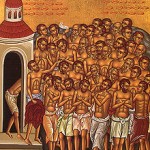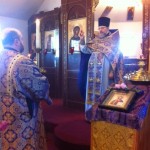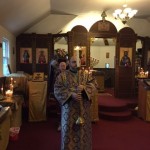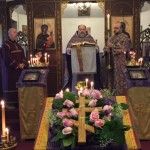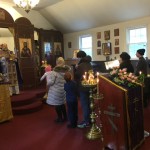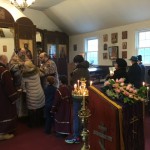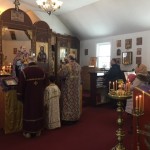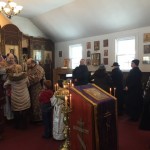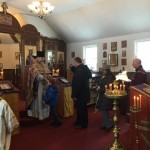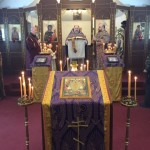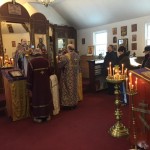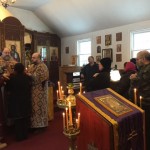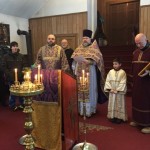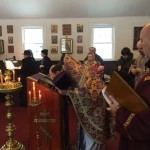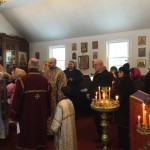On March 22, on the Fourth Sunday of Lent, and feast of the Holy 40 Martyrs of Sebaste, we had a nice liturgical celebration. St. George’s Rector, Archpriest Igor Tarasov served the Divine Liturgy. Following the readings from the Scripture he preached a homily:
“Today’s Sunday continues to lead us in our spiritual journey of the Great Fast. Today the Church wishes us to commemorate holy Father John Climacus, or John of the Ladder, a holy monk who lived in the monastery on Mt. Sinai and became an author of the book called “The Ladder of Divine Ascent”. But since today we celebrate feast of the Holy 40 Martyrs of the Sebastian Lake, we omit the commemoration of St. John. We honor those 40 champions of faith who received the crown of martyrdom in the 4th century.”
“Holy 40 Martyrs were the soldiers of the Roman army at the time when Christianity has just become a predominant religion of the Empire. However, a ruler of the Eastern part of the country, Licinius who was against Emperor Constantine, was a pagan, and he continued to persecute Christians in his land. But 40 of his warriors refused to renounce Christ and firmly declared their faith. Therefore, they were tortured. They were forced to get into the waters of the lake near the city of Sebaste. At this time, at the end of March, it was very cold there. Sebaste was located in the region called Great Armenia. Now it is in the middle of Turkey. The climate there is pretty cold in winter. I checked the usual weather in that city and found out that the normal low temperature in March is 29 degrees F. So, the lake was very cold and filled with ice. But the Martyrs bravely went into the icy waters. They took off their clothes saying, “Let us put off the man of old and let us inherit Heavenly Kingdom!” They endured in the lake the whole night and did not die. The Lord gave them strength to overcome the cold of the icy lake. After that the torturers had to put them to death.”
“The example of the Holy 40 Martyrs of Sebaste teaches us that these people had a great and strong faith. They probably did not know much about Theology. And Theology was not very elaborated in those times. But they believed in Jesus Christ, so they could endure the sufferings and receive the crowns for the Kingdom of God. And today’s first Gospel reading of St. Mark is telling us how important to have faith. Faith helps people to acquire many gifts. Today’s Gospel tells that faith helped a father of a young man possessed by a demon. Due to his father’s faith, he was made whole by our Lord Jesus Christ.”
“Lack of faith becomes the reason for many troubles in the world. People who have a very shaky and small faith are easy to be drown away from the right perception of everything around them. This is why we have so many problems in the society, so much immorality in the conduct of the people. For example, our city of New York is now having so many problems also because our Mayor and his officials have a very little faith in God. Otherwise, they would not support and promote sinful lifestyle. But not only secular people, a number of religious communities now support sinful behavior. Episcopal and recently Presbyterian Church decided to bless same-sex unions. We may not realize how it will affect our life, but if we do have faith, we should remember that these sins are calling heaven for revenge. That means that those who engage in these sins are going to punished not only in eternity, but also in this life. And religious, so-called ‘Christian’ communities should remember that. But their faith is little and shaky, so they forget what is written in the Scripture.”
“The world populated with people having insufficient faith resembles a chaos. People suffer in that world because they lack faith. This why our Lord Jesus is shown losing His temper in today’s Gospel and exclaiming: “O faithless generation, how long shall I be with you? How long shall I bear with you?”(Mk. 9, 19). And when faith is lacking, the people and the world becomes driven by the evil forces, because they have no difficulty to overcome them. The example of the young man possessed by such evil force in today’s Gospel has to show us what may happen to the people lacking faith and not living a spiritual life. They may become prisoners of evil and have no possibility to free themselves.”
“On the other hand, if people have faith, all things become possible. God’s power is being then released through peoples’ faith. And our Lord seeks to elicit such faith from us, as He was seeking to find it in the father of the possessed young man. We read that the father was not certain about his faith in Jesus. He pled with the Lord: “Lord, I believe, help my unbelief!”(Mk. 9, 24). What was that? It is a faith, but faith seeking God’s help. The presence of a doubt does not mean the absence of faith. Christ honors whatever faith we have, as long as it is sincere. He then will increase our faith when we sincerely desire Him to do so.”
“Therefore, dear brothers and sisters, let us cherish and hold our faith, so we could not be called “faithless generation”. Let us rather understand that our faith may not be great, but let us sincerely ask the Lord to increase it through His divine grace. Let us exclaim with the father of the young man: “Lord, I believe, help my unbelief!” Then He will help and make our faith strong and making wonders. And thus, let us persist in our spiritual journey toward His holy Resurrection.”
Upon the Liturgy dismissal the Rector preached a short sermon in Russian to convey the ideas of his previously preached homily.
Following the service our Rector and parishioners enjoyed delicious meals and a nice company at the coffee hour.

